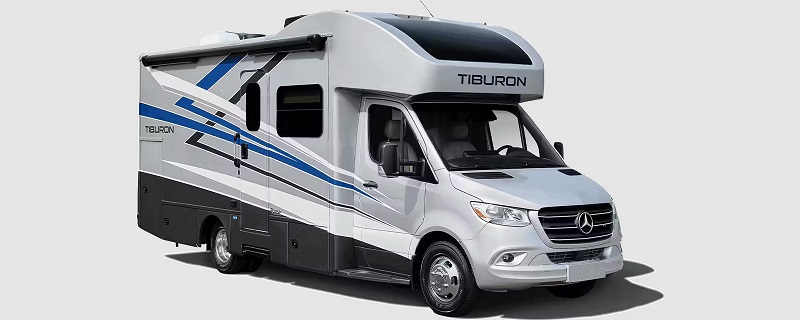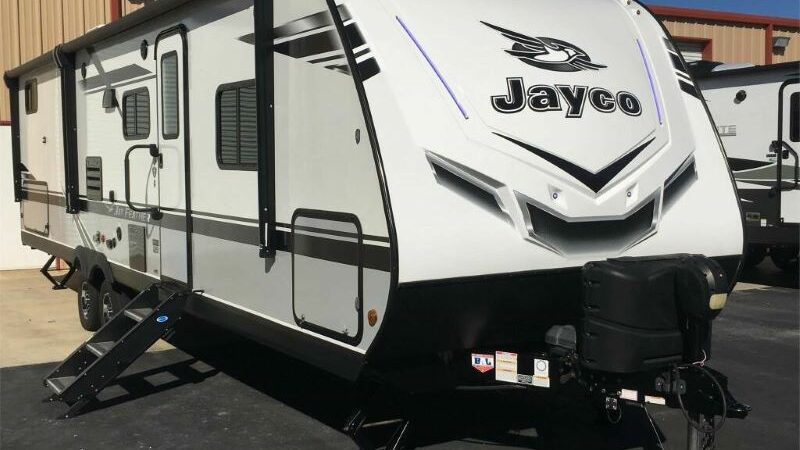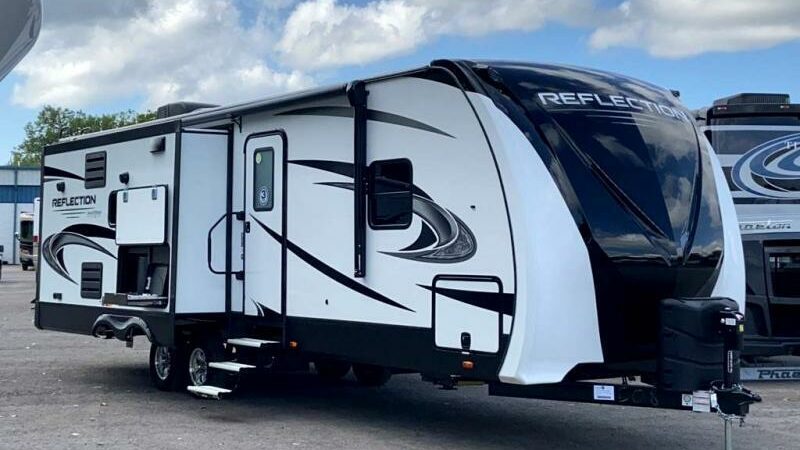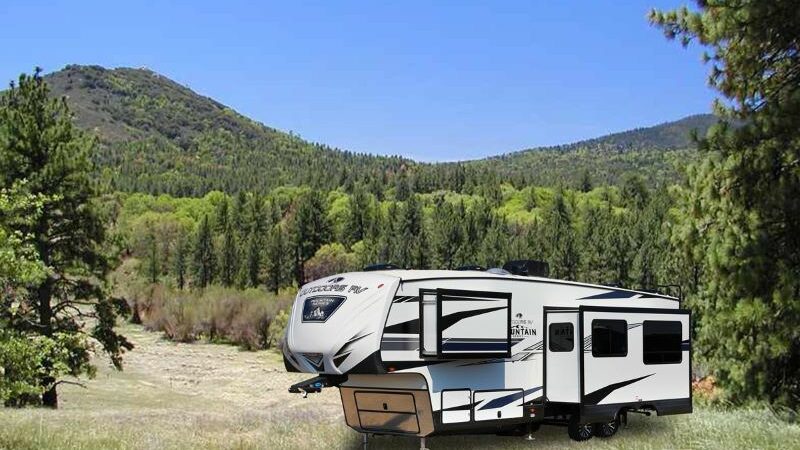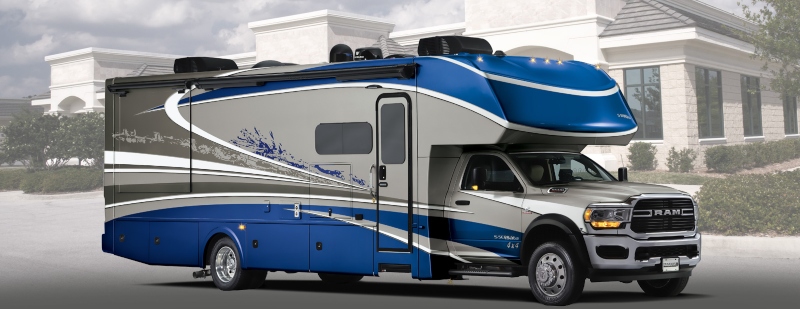How Often Should You Rotate RV Tires?
Thanks for your support! If you make a purchase using our links in this article, we may make a commission. And, as an Amazon Associate, I earn from qualifying purchases. See the full disclosure here.
There’s only one part of your RV that should be touching the highway when you travel: the tires. Any veteran RVer will be the first to tell you that you should rotate your RV tires regularly.
More than anything else, it’s a matter of safety, especially if you spend a lot of time traveling across the country in your RV. Every time you rotate your RV tires, you enhance the safety, fuel efficiency, and durability of the tires and your suspension system.
Should You Rotate Your RV Tires Regularly?
Every aspect of RV maintenance requires a degree of regularity, and your RV tires are no exception. You should rotate your RV tires regularly and establish an inspection routine every few months. Doing a quick visual inspection before and after each trip is also a good idea.
There’s no telling what your tires might pick up between point A and point B, not to mention the alignment issues that crop up from time to time. If you hit a hard bump, that’s enough to knock the alignment off.
How Often Should You Rotate Your RV Tires?
You should rotate your RV tires according to manufacturer recommendations, which is usually every 3,000 to 8,000 miles. Sure, that sounds a bit excessive, especially compared to passenger vehicles. But we can all agree that an RV is a different animal than a family SUV or a pickup truck.
Whether you’re in a motorhome or pulling a travel trailer, the immense weight and the intense pressures created from inertia place the RV in a different category.
What Happens If You Don’t Rotate Your RV Tires?
There’s no way of saying something will happen if you don’t rotate your RV tires. The point is the odds of something bad happening increase dramatically the longer you go without rotating them.
- Uneven wear
- Tire blowout
- Poor handling in inclement weather
- Increased replacement costs
- Misalignment issues
- Tire tread degradation
Some will argue that rotating your tires endangers the RV by creating misalignment issues. The argument has some validity, but we’ll cover that in more detail below. As for the rest, these are real issues that crop up when you go a long time without a tire rotation.
How Much Does it Cost to Rotate RV Tires?
Tire rotation is a maintenance routine that should take place more often than a tire change. An RV tire rotation costs anywhere between $100 and $300, depending on your class of rig. In some cases, a tire balance is included, and in some, you’ll need to pay extra.
Can You Rotate Your RV Tires On Your Own?
You certainly can rotate your RV tires on your own as long as you have the equipment, the know-how, and the energy to do it. Due to their weight, you may need an air-powered impact drill, an air compressor, and some hydraulic, heavy-duty jacks and jack stands for Class A and Class C motorhomes.
These aren’t car tires. Unless you’re looking at a small camper or travel trailer, you might not get those lugnuts off with a crossbar. Also, RV mechanics don’t play around when they tighten those lugs down. Plus, you have to be precise. If you don’t know what you’re doing, there’s the potential for damage or misalignment.
Is it Okay to Rotate Your Tires Every 10,000 Miles?

It’s not okay to rotate your RV tires every 10,000 miles unless specified by your manufacturer. Waiting too long may violate the warranty on the tires. That’s why it’s so important to pay attention to manufacturer recommendations.
Some RV tire manufacturers of diesel motorhomes recommend 10,000 miles, but many recommend much sooner for other RV classes.
If you fail to rotate your tires on time and one side wears down more than another, that’s an obvious and noticeable fault when you take it in for repair. RV tires are not cheap, so you don’t want to lose that warranty coverage because you didn’t feel like rotating them promptly.
Can You Rotate Your Tires Too Often?
You can rotate your tires too often. The point of a tire rotation is to maintain an even wear across the tread surface of your RV tires. If you rotate too soon or out of sync, you’ll create uneven wear across the contact surfaces of each tire.
Where Can You Have Your RV Tires Rotated?
Regular mechanics shops are out of the equation when it comes to motorhomes and travel trailers. In most cases, the RV dealership you purchased it from will do the work. Some dealerships also contract third-party repair and maintenance shops as well.
Do You Have to Balance Your Tires Every Time You Rotate Them?
The two words “balance and rotation” are nearly synonymous. It’s rare to hear one without the other. You don’t have to balance the tires every time you rotate them.
However, getting them both done is always a good idea. If it’s a DIY rotation, you can only balance them with the proper equipment anyway.
How Often Do I Need to Rotate My RV Tires if I Don’t Drive Much?
Your RV tires degrade as it sits in a garage, storage unit, or driveway. Fortunately, tire rotation has little to do with that, and you don’t have to rotate them as often if you aren’t going anywhere.
On the flip side, your tires may not be rolling, but maintenance on them is more important than ever. Keep them covered, inflated to the proper PSI, and cleaned while your RV sits. It will make a huge difference in longevity and durability.
How Often Should Motorhome Tires Be Rotated?
The 6,000 to 8,000-mile rule still applies. However, the odds of rotating your motorhome tires before changing them are slim. You may not ever rotate your motorhome tires simply because you’re getting new ones every time a rotation mileage comes around.
There are two reasons this may occur. The first is the typical weight and inertial forces applied to a motorhome are often far higher than a travel trailer.
The second is the difference in the tires. A motorhome has active tires versus the reactive tires of a travel trailer. One is pulled, and the other is driven.
How Often Should You Rotate Your Travel Trailer’s Tires?
The same rule applies to travel trailers, at least in general. A huge, fifth-wheel travel trailer with a 20,000 GVWR is different than a two-person teardrop. You should stick with the manufacturer’s recommendation, which will probably be 3,000, 6,000, or possibly 8,000 miles.
Do All of My RV Tires Need Rotating?
Yes, all of your RV tires need to be rotated. You should follow the same direction for each axle every time. Every tire rotation should be a mirror image of the last tire rotation.
If all of the tires are rotated in a counterclockwise direction the first time, that’s how they should be rotated for the rest of the RV’s life span.
You should never selectively rotate some tires while leaving others in place for another time. Since the entire point is to even out the wear and tear, leaving some tires out of the rotation process will throw everything out of balance.
Can Rotating Tires Affect Alignment?
We mentioned how rotating tires can affect the alignment above for a good reason. Rotating tires, especially if you do it yourself, has the potential to affect the alignment. There’s a wrong and right way of doing this. If you rotate the tires the right way, the RV’s alignment will never be an issue.
Complex suspension systems or suspension systems that need some maintenance can play a role in a misalignment resulting from a tire rotation. If you’re worried you can’t do it yourself, don’t hesitate to take your RV to a professional and get it done the right way.
Why Should I Get My RV Tires Balanced?
Getting your RV’s tires balanced improves the RV’s stability, comfort, and overall safety. There’s no reason you shouldn’t get the tires balanced. The best time to get it done is when it’s due for a tire rotation.
It’s especially true for travel trailers since the driver of the towing vehicle may not feel a slightly imbalanced tire as it wobbles down the road.
Can I Balance My Own Tires?
You can balance your own tires only if you have the right equipment. There’s a way to DIY it, but it’s not recommended because it’s an old-school method known as “static balancing” with a bubble balancer.
- You’ll need an unmoveable tire balancing post (difficult to find)
- Remove the tire
- Remove the weights on the tire
- Clean all dirt and debris from the tire and wheel
- Place the tire on the post and allow it to settle
- Check your leveling bubble on the post
- Add weights to the inside or outside of the rim
- Check leveling bubble
- Rinse and repeat until its level
8 Other Essential Tire Maintenance Tips
1. Make Sure Tires are Properly Inflated

Monitor your PSI in each tire religiously. Proper inflation and manufacturer-recommended PIS will improve tread life, performance, fuel efficiency, and longevity of the tire. Consider putting nitrogen in your tires since doing so has some longevity benefits.
2. Watch Your Tire Tread
Use the penny method or a tire tread depth gauge to keep track of the tire tread depth. Your tires should have more than 2/32 of an inch tread depth. If you can see the top of Lincoln’s head/hair, it’s time to get a new tire.
3. Check for Lodged Objects
One of the easiest maintenance routines you can do is a simple visual check of your tires every time you stop. It’s common enough to pick up nails, roof tacks, and worse. This is especially if you pull over on the shoulder, pass through a median, or go off-road.
4. Invest in a TPMS
Most new travel trailers and motorhomes have a TPMS (Tire Pressure Management System). If yours doesn’t have one, many affordable options are available, and they’re easy to install. We use the Tire Minder TPMS ourselves because we think they are the best brand on the market.
5. Look for Sidewall Cracks and Bulges
RV tires are designed with stiffer and thicker sidewalls, but that doesn’t mean they are impervious. Look for hairline cracks along the sidewall or places in the sidewall that bulge out abnormally.
6. Load Your RV Evenly

Weight distribution is crucial. The insane forces working on a travel trailer or motorhome, coupled with the immense weight of the RV itself, are a recipe for damage if you don’t balance out your weight distribution.
7. Don’t Store Your Rig Longer Than 6 Months
You might be surprised to learn that long-term RV storage strains the tires as much as driving on them, sometimes more. Many RVers store their RVs throughout the winter, but you should never do so for 6 months or longer.
8. Replace Tires When Needed
If you have a good routine and practice regular tire maintenance, you’ll know when your tires are ready for a change. Once that time comes, don’t hesitate to get it done or try to wait it out for after the next trip.
So, How Often Should You Rotate Your RV Tires?
There are a lot of different tire brands out there, but every one of them comes with manufacturer recommendations. You should follow those recommendations without fail, if at all possible.
If the tires look great, the consensus is between 6,000 and 8,000 miles. You’re taking a risk out there on the highway if you go beyond 8,000 miles, especially if there is visible wear and tear on the tires.
Outside of that, establish a good inspection routine, keep the PSI within recommended levels, keep the tires clean, and periodically check the tread. The tires are one of the most important maintenance items on an RV. You take care of them, and they’ll take care of you.
Related Reading:
1. Do Travel Trailer Tires Need to Be Balanced?
2. How to Prevent RV Tires from Dry Rotting
3. 115 Point RV Inspection Checklist (New or Used)
4. How to Check for RV and Travel Trailer Recalls
About The Author:
Thomas Godwin is a full-time freelance writer with a BFA in Creative Writing, a U.S. Marine, and an avid outdoorsman.
When he’s not writing, he’s raising chickens and Appleyard ducks. Thomas also constructs teardrop campers (attempting to anyway) and kayaks the Blackwater River with his wife, two daughters, and his Dobermans.

Source: https://rvblogger.com/blog/how-often-should-you-rotate-rv-tires/


